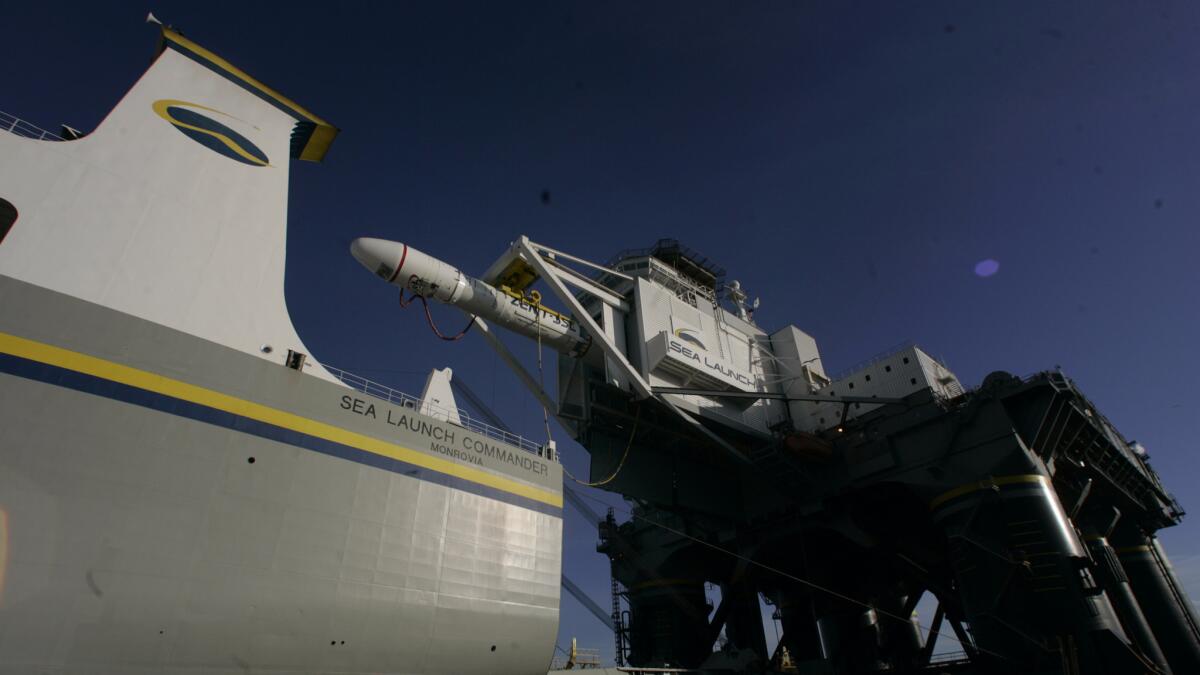Sea Launch to be acquired by Russian aviation holding company

Sea Launch, a satellite launcher that has flung rockets into space from a floating platform in the Pacific Ocean and has its home port in Long Beach, is being acquired by a Russian firm.
S7 Group, a private aviation holding company, said it signed an agreement Tuesday with Sea Launch Group to acquire the launch provider’s assets.
That includes the Odyssey launch platform, which is a modified oil rig; the Sea Launch Commander vessel, a specially designed cargo ship that carries rocket components and payload and can serve as a launch control center; the Sea Launch trademark; and the ground support equipment at Sea Launch’s home port facility in Long Beach.
Launches have been on hold since 2014.
The deal is expected to close in six months and is subject to approval from various U.S. authorities, such as the Department of State’s Directorate of Defense Trade Controls and the Department of Treasury’s Committee on Foreign Investment in the U.S.
S7 Chief Executive Vladislav Filev said his company plans to restart launches in late 2018.
Filev predicted S7 will be able to launch up to 70 times within 15 years “without making any major investments in upgrades to the Sea Launch complex.”
“The acquisition of the Sea Launch is a ‘ticket’ for us to enter the space industry,” he said in a statement. “Space infrastructure is developing rapidly. In our view, it is a very exciting area of business, with good long-term prospects.”
Sea Launch was established in 1995 originally as a joint venture of Boeing Co., a Norwegian shipbuilder, two Ukrainian rocket companies and RSC Energia, a rocket firm partially owned by the Russian government.
It launched rockets from a remote location about 3,300 miles southwest of Long Beach and 1,400 miles south of Hawaii — a spot that would enable satellites to reach orbit faster while burning less fuel by using the Earth’s rotation as momentum.
Just as the venture was becoming operational in 1999, the demand for satellites plummeted. By 2002, Sea Launch had sent up only one satellite. In 2009, the company filed for bankruptcy protection, and in 2010, an affiliate of RSC Energia bought a 95% stake to lift Sea Launch out of bankruptcy.
Boeing sued its former partners for more than $355 million in 2013, alleging that RSC Energia and the two Ukrainian rocket companies failed to repay loans. In September 2015, a court issued a summary judgment in favor of Boeing, according to Space News.
For more business news, follow me @smasunaga
ALSO
Rocket Lab finishes launch complex in New Zealand
SpaceX’s Elon Musk is set to announce plans for colonizing Mars
DJI shrinks and simplifies its new Mavic Pro drone, giving GoPro’s Karma a rival
More to Read
Inside the business of entertainment
The Wide Shot brings you news, analysis and insights on everything from streaming wars to production — and what it all means for the future.
You may occasionally receive promotional content from the Los Angeles Times.









